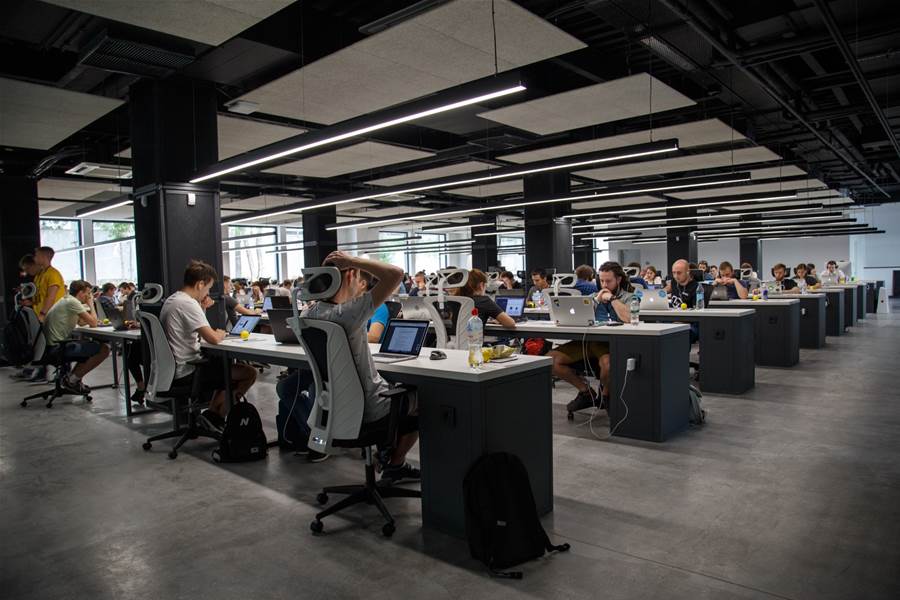Tips for transitioning back to the workplace

Transitioning employees back to the office isn’t as simple as throwing the doors open and expecting people to be back at their desks. Ways of working and expectations around hygiene and workplace safety have fundamentally changed.
Different workplaces
Department of Health in many countries have published guidelines on reopening workplaces, focusing on people, space, sanitisation, record keeping.
Social distancing is here to stay. The concept of working closely together - physically - is no longer possible in the new world. We start to see new rules around the distances that people will need to maintain. For example, Australian Department of Health has recommended one person for four square meeting rule for all workspaces.
This means desks arranged differently, possibly a return to cubicles or screens between desks rather than open plan, and large meeting rooms rather than small huddle rooms. Overall it will be a "low-touch" scenario.
Hygiene standards will also be much more stringent, with government and industry bodies publishing guidelines on how routine cleaning, and cleaning and disinfection should take place. Rooms will be routinely cleaned after meetings and between any hot desking that remains. BYO technology will increase as device sharing declines.
Different teams
Tomorrow’s workplace will be markedly different from what we’re used to. There will still be a need to be in the office but it’s likely that many people will have choices and continue to work remotely, full-time or part-time. With benefits such as no commuting, flexibility, more time for family and personal activities, many workers will be reluctant to return to the traditional office-based nine-to-five. According to Gensler research, 96% of workers in the APAC region feel that their managers trust them to get their work done and 67% feel more empowered working from home.
Businesses would be unwise to try to force the clock back but instead should embrace the advantages of a distributed workforce, such as easier access to skills and higher staff retention. While coronavirus-related distancing measures remain in force, some offices may have teams coming in on alternate days to reduce overall numbers.
There are challenges with remote working. A key issue is how we treat people fairly in the virtual world? How does a meeting work when half the team are physically present in a room together, and the other half are in the virtual space? Keeping remote employees engaged is important.
Sick leave will be another issue. Previously many people came into the office with a minor cold/runny nose, but coughing and sniffing colleagues will be a thing of the past. At least until a COVID vaccine is available, most workplace policies will preclude staff coming in if they have any symptoms of illness. Remote working may be an option for some but organisations should anticipate higher sick days overall.
Different technology
The pandemic lockdowns have resulted in a sharp learning curve for organisations and their employees when it comes to remote working. People have improved certain skills, become familiar with new technologies and have developed new ways of working and collaborating.
A rise in laptops and decline in desktop PCs is likely to result from the greater need for mobility and for personal devices. Having staff with laptops will also create more flexibility generally: enabling them to bring devices to meetings, and to work from any area in a physical workplace as well as remotely.
Employees will still need to be supplied the right equipment when working remotely. Professional grade technology is even more important when outside the office, as is setting up a suitable area to work from. Communication and collaboration problems, issues with technology and software and the home environment all came up as pain points for many work-from-home employees. Whereas people with an ergonomic setup/functional space for work reported 14-16% higher work-from-home satisfaction scores in the Gensler study. People who said that they worked in a variety of spaces in their home throughout the day were also more satisfied.
Using professional collaboration platforms is one important way to address this. Collaboration platforms were reported as the most effective communication tool (75%) over emails and phone calls (70%). Meetings also need to be seamless: a HighFive study found that nearly 40% of meetings have hardware or software technical issues, taking on average 12.3 minutes to resolve, with one in four employees having to call IT help for at least half their meetings. 67% of respondents found background noise to be a problem at least some of the time, with 40% reporting frequent audio quality issues.
As well as high grade videoconferencing equipment, AI may also play a more significant role, for example speaker framing in rooms and ANC and Acoustic Fence in headsets, desk phones and meeting solutions.
Being forced into working remotely has taught businesses and workers a lot of lessons that they might otherwise have taken years to learn. We are now aware of our capabilities and limitations both as individuals and as organisations. Our relationship with technology and its role in the future workplace is better defined. Above all, we know that when push comes to shove, we can run our businesses from anywhere, successfully and productively, if we have the right skills, tools and training.
Bill Zeng is Chief Technology Officer, APAC, Poly










